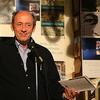David Krasnow appears in the following:
La Musica Della Mafia
Saturday, December 13, 2003
The songs in this collection of traditional Italian folk music were all written by, for and about the Mafia, and provide a tantalizing oral history of Italy's mythic criminal universe. Produced by David Krasnow.
Money
Saturday, November 15, 2003
In 1978, in the worst urban blight New York City had ever experienced, the filmmaker Henry Hills found the arts thriving in the in the cracks in the asphalt. He filmed dancers improvising in vacant lots, poets giving lectures on the street, and composers like John Zorn giving loft concerts. ...
Billy Collins/Walt Whitman
Saturday, November 08, 2003
Billy Collins just completed his term as Poet Laureate of the United States. Collins reads from Walt Whitman's Song of Myself and talks about the challenge of writing poetry about big things like democracy. Produced by David Krasnow.
Documenting Dance
Saturday, August 02, 2003
You may remember a part of a dance you’ve seen, a beautiful movement or a striking arrangement of bodies. But you probably couldn’t recreate those things, and you'd have a tough time trying to convey someone else how to do the dance. As David Krasnow discovered, dancers themselves are ...
Birth of the Novel
Saturday, June 21, 2003
A couple of centuries ago, when the novel was first coming into its own in English literature, writers and publishers had no scruples about pretending their fiction was the god's-honest truth. Then as now, lots of readers felt that nonfiction was more important. Studio 360's David Krasnow went looking ...
Dia Beacon
Saturday, June 14, 2003
Kurt Andersen and Michael Govan, the director of Dia:Beacon, tour this new museum housed in an old printing building in the Hudson Valley, about 75 miles north of New York City. Dia made this space so it could house sculpture and art that would never fit comfortably in ...
Money
Saturday, May 10, 2003
In 1978, in the worst urban blight New York City had ever experienced, the filmmaker Henry Hills found the arts thriving in the in the cracks in the asphalt. He filmed dancers improvising in vacant lots, poets giving lectures on the street, and composers like John Zorn giving loft concerts. ...
Matthew Barney at the Guggenheim
Thursday, March 13, 2003
New York, NY —
The Guggenheim Museum has just unveiled one of the art world's most anticipated spectacles: an exhibition of Matthew Barney's Cremaster cycle. The show includes sculptures, photographs, banners, installations, and feature films. It also features the use of non-traditional unstable materials...like vaseline.During the installation, David ...
Matthew Barney
Saturday, March 08, 2003
Last month, the Guggenheim Museum unveiled one of the art world's most anticipated spectacles: an exhibition of Matthew Barney's Cremaster cycle. In the films and sculptures that make up the Cremaster cycle, Barney makes bizarre use of everyday materials, including concrete, tapioca, Vaseline and rock salt. While the ...
Anonymous
Saturday, February 01, 2003
When we think about support for the arts, certain names come to mind, like Mellon, and Guggenheim, and MacArthur. But in every concert hall and museum, the wall of benefactors is engraved with a few patrons who go by "anonymous." Who are these people? Produced by David Krasnow.
The Icarus Paintings
Saturday, January 04, 2003
The myth of Icarus symbolizes fleeting glory, and the foolishness of flying too high, literally and figuratively. A story about Spencer Finch, a painter who tried to depict Icarus' hubris and doom. Produced by David Krasnow.
Toy Piano
Saturday, December 28, 2002
Margaret Leng Tan, a virtuoso of the grand piano, takes Schroeder‘s place at the plastic one.
(Originally aired: July 4, 2002)
Documenting Dance
Saturday, December 07, 2002
You may remember a part of a dance you’ve seen, a beautiful movement or a striking arrangement of bodies. But you probably couldn’t recreate those things, and you'd have a tough time trying to convey someone else how to do the dance. As producer David Krasnow discovered, dancers themselves ...
La Musica Della Mafia
Saturday, October 05, 2002
The songs in this collection of traditional Italian folk music were all written by, for, and about the Mafia, and provide a tantalizing oral history of Italy's mythic criminal universe.
Mysterian Shapes
Saturday, September 21, 2002
When east coast photographer Nick Muellner set out for the arid basins of southeast Utah, he brought with him a book by the Russian writer Vladimir Nabokov. And when Muellner's photographs turned out stranger than he expected, he found himself trying to crack open Nabokov's perfectly constructed literary images.
Pauline Oliveros's Deep Listening
Saturday, August 31, 2002
Producer David Krasnow profiles the experimental composer Pauline Oliveros, who built her career on what she calls “deep listening.”
(Originally aired: April 25, 2002)
The Icarus Paintings
Saturday, July 13, 2002
The myth of Icarus symbolizes fleeting glory, and the foolishness of flying too high, literally and figuratively. Spencer Finch is a painter who tried to depict that myth, and capture Icarus' hubris and doom.
Toy Piano
Saturday, July 06, 2002
Margaret Leng Tan, a virtuoso of the grand piano, takes Schroeder's place at the plastic one.


